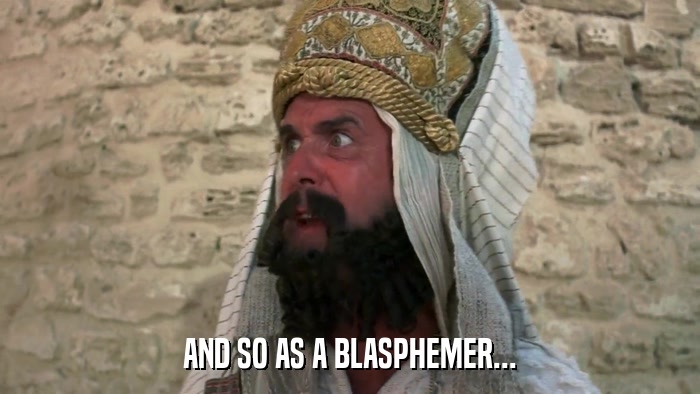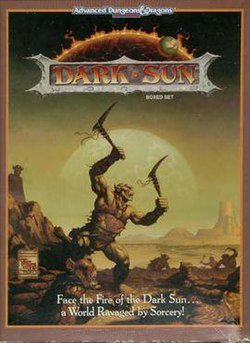Normally RPG books like to start with things like 'what is an RPG'. This one doesn't do that - presumably since it's an OGL product they're confident that you know what Dungeons & Dragons
is as well as the concept of role-playing. They do have to explain why you might want to choose biblical role-playing as well as the assumptions that they're making.
They've opted for a cultural-relativist standpoint -
all the myths are real, even the ones that contradict others.

You're in good company, Ned
Thus the Egyptian gods are real and Moses has power because he's a 20th level character.
Personally, I think that's a much more defensible position than trying to go to a straight historical version where there is no magic (and therefore very little fun stuff for D&D).
They focus on four main cultures: Babylonians, Canannites, Egyptians, and Israelites. All characters have to pick a flaw (but you don't get a bonus feat or anything) - they just don't think you should be 'perfect'. I don't think they give a good justification - even if you don't take 'deceitful' as a flaw, you can still lie. I think the flaws
as presented just create another friction point to argue with your GM about whether you NEED to steal the jewel because you're Covetous, even though you'll clearly get caught and could get killed. You might be best off taking multiple flaws so you can justify NOT doing the things that your first flaw tells you. If you're a BULLY and a COWARD, well, you're probably free to act however you want, rather than being beholden to a single impulse.
Each cultural group has a limited list of classes they can choose. For reasons that make no sense to me, they choose to list
prestige classes among the classes available to each culture. Since we're still in character creation, having a better division between base class and prestige class is warranted. And of course, as with all 3.x products, there is no consideration of OTHER SOURCES. If Assassin, Blackguard, and Lore Master are listed as 'allowed', but Dwarven Defender is not, that's clear until sources outside of the 3.0 DMG are considered. To some degree, that's not an issue if there is sufficient material IN THIS BOOK.
Focusing on base classes from 3.x
only, the following classes are permitted: Bard, Cleric, Fighter, Paladin, Ranger, Rogue, Sorcerer. To me it seems strange not to permit a raging Barbarian (they name-check
the Sea Peoples and they're mysterious enough that they could definitely justify another martial class. Druid and Wizard might be more sensible omissions (especially since there are culturally specific classes to replace them) and while a 'wanderer of the earth with mystic wisdom from the east' might not make intuitive sense, I think you could justify it.

More easily than we can justify David Carradine as Caine
Ultimately, there are some constraints from the setting, but with most 'standard classes' available they're easily ignored. As for 'culturally specific access' to the base classes, well, I thought everyone realized that limiting access to classes in that manner just didn't work. 3.x was better for having the OPTION of Dwarven Wizards - you can distinguish cultures by what classes are COMMON at least as easily as what classes are AVAILABLE. In any case, not only did
Testament choose to limit access to the base classes by culture, each of their new classes is culture specific. We'll look at them in the same order the book presents them:
Israelite Classes
The new classes available to Israelites are: Levite Priest (replaces Cleric), and Psalmist (replaces Bard). The table lists one additional Base Class; the Prophet, but that class is described in the Prestige Class section.
The Levite Priest looks like a cleric (same BAB, same Saves) but 6+Int skill points and the spell progression is slightly better (they get 6+1 1st/2nd/3rd level spells at 20th level instead of 5+1) and they get up to 10 orisons, rather than capping out at six. They replace turn/rebuke undead with turn/rebuke demon-possessed, but then they get 8 additional abilities over the 20 levels. They also get to spontaneously cast all of their spells using their open slots! They lose access to Heavy Armor and Shields, but on first glance, it would look like a straight power-up. Well, there's one huge complication. They don't refresh spell slots. They need to visit the temple and make a sacrifice (or promise to do so). They also lose spell-casting when they are ritually unclean (which is actually really common). While 'Piety' (their replacement system for alignment and something I'm going to talk about more later) is listed as 'OPTIONAL', this class has a list of spells that are supposed to require a successful piety check to cast these 'obviously magical spells'.
At 3rd level they can craft a phylactery which allows them to cast orisons as though they were quickened, raise the DC of all spells they cast by +1, it replaces the divine focus/material components less than 100gp, and provides +1 on a bunch of skill checks related to spell casting. At 5th level they gain Arcane Spell Resistance 5+Level; at 8th level they get a +2 AC against snakes (including dragons) and they can speak to serpents; at 10th level they can craft a scroll that does half the things that their phylactery does but also renders half of all spell damage 'divine'. At 13th level spells that inflict disease get a +5 bonus to the DC to resist. At 15th level he can add a +1 to +3 bonus to attack and damage rolls; at 18th level he can turn/rebuke dragons; and at 20th level if you kill the priest you automatically get an affliction. I'm not sure that's much comfort to the player of the 20th level character, but hey, you gotta use those capstone abilities!
The Psalmist looks like a bard, but gets fewer skills and their spells per day/spells known cap out higher than a standard bard. Spells are Wisdom based. They have a number of special abilities. The first one requires 10 Israelites and a full round; you get a +1 to saving throws for 3 rounds +1 round per Wisdom modifier of the psalmist. Getting 10 people to stand around to get a bonus for up to 7 rounds isn't ever worth it - that's one of those 'outside of combat abilities' but it has a 'combat time duration' so it might as well not exist. At 4th level he can sing a song that gives a +2 sacred bonus to AC, but it requires a move action each round to maintain. At 6th level you gain the ability to 'recover' a spell cast - eventually up to 4/day. At 8th level the psalmist can provide fast healing 3 for a few rounds; at 12th level he can provide a +10ft movement bonus for a few rounds; at 14th level worshippers of the God of Israel can bump his CL (up to his Wis bonus) so if he has a +4 and 4 people sing with him, his CL is 4 higher for that spell. At 16th level he can provide a bonus to damage and morale checks equal to 1+Wis modifier.
Egyptian Class
The Khery-heb is the Egyptian version of the wizard. They have a number of abilities related to casting from scrolls, including the ability to cast spells from a cleric domain of their god from scrolls (but not to prepare and cast them another way). A couple of abilities are flavorful for the setting, like the ability to create a wooden statue that turns into a commoner or, at higher levels, a fighter. Ultimately, this class is a power-up for the wizard, but the designers don't really understand
why. For example, at 15th level this class can assume an animal-headed form based on their patron deity. Thoth grants a +2 to Spell DC, while Bast gives +2 to Reflect saves, Dexterity skill checks, and Spot. Basically there's a right choice and a bunch of wrong choices. At 20th level they get another +4 to spell DCs (cast from a scroll), but the game was already broken so it doesn't really matter.
Babylonian Class
The Magus of the Starry Host is the Babylonian wizard. They don't use spell books or learn to scribe/write scrolls (thematically because cuneiform is written on heavy clay tablets) but it doesn't work for PCs. To gain spells, you must go on a spell pilgrimage. You're limited to learning one spell every 30 days. In a D&D campaign where you may level up 6 times in a month, you're not going to have access to your primary class feature.
Canaanite Class
Qedeshot are fertility priestesses (or qedeshem for priests) that combine some aspects of a bard with a cleric. They get spells up to 6th level (at 17th). Instead of singing, they dance. Instead of 'inspiring' they plant a magical kiss. She also has an ability to use sexual intercourse to create a thrall - basically this class is creepy and bad.
General Class
Available to all cultures is the Spy. This class gains spells up to 4th level (and gets access to bonus spells at 5th). It's basically a rogue chassis that loses sneak attack and gains bonuses to social activities. If social skills were anything more than MTP it might work as a class.
On Classes Generally
It's a little annoying that they list each section as 'classes' when there is only one class for most cultures.
Prestige Classes
These classes are culturally specific, too. The thing about Prestige Classes is that they tend to be really specific, and they mostly come online at levels where the game breaks. So quick overview:
The Champion of Israel is a martial class that you can qualify for at 9th level. Their first level ability allows them to get +1 STR for every 2 levels they have in the class. That means that you can't actually use that ability until 2nd level. That's bad. Heck, getting +5 STR at 19th level is ALSO bad. At 2nd level you get to re-roll damage and choose the value you want. That's ALSO bad. If your base weapon damage is 1d8 your average is 4.5; with this ability your average is 6 - that's basically not as good as Weapon Focus. There are some gang-up abilities if there are a bunch of 8th level Champions, but those are 17th level characters; getting +5 damage for having 5 friends (the maximum) is not going to equal having someone with high-level spells.
The Judge is a class you could potentially qualify for at 6th level; it requires a BAB +5 so it's probably aimed at Paladins. They don't get spell casting, but they do get
Lesser Planar Ally at 4th level and
Greater Planar Ally at 10th. You know who else gets
Greater Planar Ally at 15th level? Clerics.
The Prophet is a 10-level prestige class that includes +5 levels of divine spellcasting. Since you're giving up 5 levels of spellcasting (the primary level-relevant ability for the classes that have it) the additional abilities would need to be really good. They're not. Basically they have abilities that are like spells and at 10th level they get DR 5/+1.
Like the Prophet the
Ren-Hekau is a 10-level prestige class with +5 levels of spellcasting, but arcane this time. At 10th level they can transfer part of their life-essence into a bird; if they die but the bird doesn't they're automatically reborn. But if the bird dies, they might die, too.
General Prestige Classes (meaning available to all cultures) include
Desert Hermit,
Idol-Maker,
Master Charioteer, and
Royal Astrologer.
None of these classes are worth looking at in detail - they all suffer from the same general flaw of being too specific, and sacrificing too much to advance them. If you're a 14th level character and your special ability is that you get slightly more cover from your chariot, well, you haven't made good life choices. The idea that you could be 'really good at charioting' is defensible - but most of those types of abilities can just be rolled into the skill check. Desert Hermit is a quasi-mystical Ranger; the Idol Maker and Royal Astrologer include advancing your spell casting class (+1 for every 2 levels in the class) and special abilities that don't replace what you lost.
Next up - Chapter 3: Feats
 From the back cover:
From the back cover:













